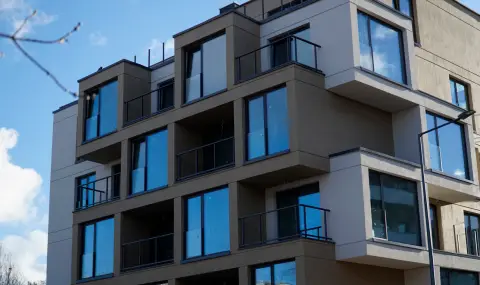In recent years, the new construction housing market has been at its peak. The interest in this type of property from buyers is high and is mainly due to the fact that customers want to move into a new and modern home, without wasting time, money and nerves on major repairs and all the negatives accompanying old construction properties.
Some of the companies operating in the Bulgarian market have decided to look to other countries where they can develop construction activities. One of them is the construction and investment company BLD, part of the leading real estate holding in our country AG Capital. The destination is Warsaw - the capital and largest city in Poland. Why Central Europe? Why Poland? Why Warsaw? What are the similarities and differences with the Bulgarian and, in particular, the housing market in Sofia? These questions are answered in a special interview for the largest real estate website in our country imot.bg by BLD CEO Dimitar Savov.
Mr. Savov, could you point out the main factors that make the housing market in Warsaw different from Sofia?
It may come as a surprise, but in Bulgaria we build better quality buildings and apartments than in Central Europe. This is also confirmed by our colleagues, whom we invited to Bulgaria to inspect and see what and how we build.
For example, in Bulgaria we invest a lot in the facades of buildings. In Western Europe this is almost a mirage, excluding the skyscrapers in London, of course. The middle-class residential buildings in the mass segment are plastered and white woodwork. Nothing more.
This is from the outside. As for the interior, you know that we place a lot of emphasis on good layout. For us, the apartment is more important than the building itself. Here comes one of the main differences between Bulgarian and Polish housing. Poles live in much smaller rooms. I'll give you an example: a bedroom of 10 sq m. In Poland, the Czech Republic and Hungary, this is a master bedroom. For a Bulgarian, it is unthinkable for a bedroom to be such a small square footage.
Another significant difference is that in Poland there is no apartment with two bedrooms and two bathrooms. Most homes have one bathroom. It is a luxury if there is a separate toilet. For us, this is a bit stressful, because in Bulgaria such a property can hardly be sold, and in Poland it is the opposite - the other becomes difficult to sell.
Why Poland?
Bulgaria and Poland are the only countries in which homes are sold with plaster and screed. We also found that the mentality of the Polish and Bulgarian clients is very similar. Poles like to finish it themselves, to use the services of designers. In other countries - Romania, the Czech Republic, Hungary, the builder finishes it and the client moves in with only his portable furniture - sofa, wardrobe, table, chair.
The good thing we can learn from Poland is that they sell the net square footage, i.e. the light area. The light area differs from the total area by about 40%, because here walls are not included. Absolutely nothing is included. In this way, one can be fooled into thinking that the price in Bulgaria is low compared to theirs. In principle, it is close, even if we include the common parts.
This practice of buying on a clear area is very beneficial for the client, since he buys exactly as much as he needs.
In Bulgaria, in order to implement this, a legislative change is necessary.

Bulgarians or Poles are “more difficult” customers?
Poles are not more demanding. It is much easier to make deals.
And what is the price discount in deals?
It is interesting to note that the Poles have a very strong Association of Entrepreneurs. If you are not a member of this association, you do not have the right to build there and be an entrepreneur. This also gives buyers a lot of security.
For the first time in the last 15 years, Polish construction entrepreneurs complained this year that they had to make discounts within 2-3%. This surprised us as Bulgarians, since we are used to negotiating the price. In Poland, this is not the practice.
Another specific feature of the Polish market, which was implemented with the help of the state, besides being a member of this association, is related to sales “on green“. If you want to sell “on green“ you pay a certain percentage of your sales. The amount is deposited into something similar to a guarantee fund, which is under the management of the state. The goal is that if something happens to the entrepreneur, the money collected can be used to guarantee the completion of the building.
This is a very good practice and I would be happy if it were adopted in Bulgaria. We have tried a similar initiative, but no one from the state is yet willing to take on its implementation.
If you don't pay this amount to the association, you can build, but you can't sell and collect contributions "on green". And in Poland, most people buy "on green".
How much does it cost per square meter of living space?
On average, about 17,000 zlotys (4,000 EUR) per square meter. They are not allowed to sell in euros there. Unlike the Bulgarian market, the market in Poland is entirely in local currency.
How fast is construction in Poland?
Very fast. We are impressed by the pace of construction. A project of about 300 apartments, which was bought in July 2023, is now (editor's note: December 2024) already on the 7th floor. Very large-scale construction. Huge volumes are being built.
For comparison, in Sofia, according to our calculations, between 8,000 and 9,000 apartments are being built per year. In Warsaw, about 40,000 units are being built. The capital has room to expand.
It is important to note that the municipality plays a very strong role in this process. First, the infrastructure is built and then the building. If there is no infrastructure in a certain area, the municipality does not leave the entrepreneur to decide the issue on his own, but there is an infrastructure fee that is paid to the local authorities.
Things are happening more slowly than in Bulgaria, but if you have a building permit, this really means that you have a permit, because in Bulgaria it means nothing.
Is there migration from smaller cities to the capital?
In Poland, secondary cities are very well developed – Wroclaw, Gdansk, Krakow (it's almost impossible to do here, since it's a historical city), Łódź. There are 5-6 cities that have a very good real estate market and a strong economy.
There is a secondary housing shortage in Poland, as the country has not yet fully recovered from the damage caused by World War II. Everything was destroyed then. And since then there has been a chronic housing shortage. It is interesting to note that in the Old Town of Warsaw everything was rebuilt in the 1960s according to pictures.
Do most Poles live in rented or own homes?
The only markets where people live more in rented homes are England and Germany. But this is due to the unavailability of housing. In Poland, about 75% of the population lives in their own homes.
The product that we created, build to rent, has developed a lot in Poland. We are already building a second similar building. One is 90% rented. But it filled up much more slowly than the buildings in Poland. There this concept is much more popular. There are many more households consisting of one member and living in such buildings. They are more mobile and are not tied down.
The build to rent concept is a bit revolutionary for our client, because the product we offer is that the client rents an apartment, with everything included in the rent and the client does not take care of anything. The problem is that the client in our country makes a comparison with an apartment in a panel house and says that the rent there is half. But those who trusted us, lived and are now our regular customers.
Detailed statistics on average property prices in Bulgaria by city and neighborhood can be seen HERE
